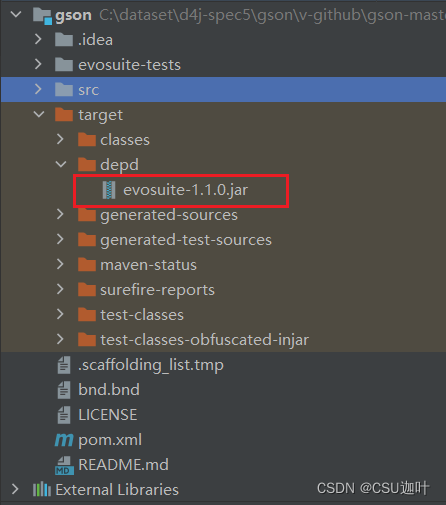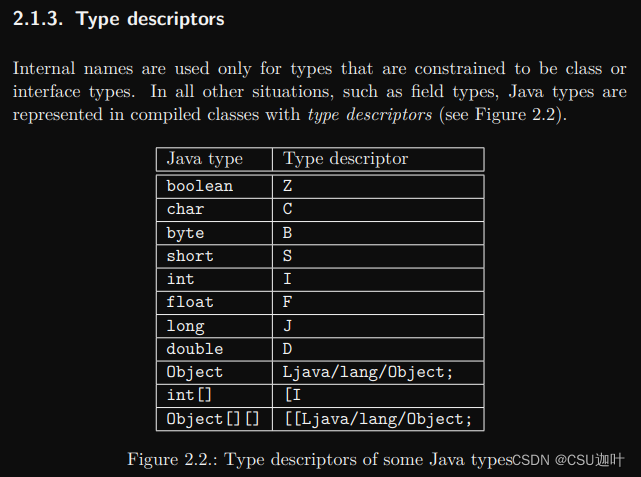如何使用evosuite为指定被测方法生成测试用例

目录
省流版本
准备工作
evosuite获取
检验环境
参数解释
怎样表示被测方法
怎样指向被测类
其他参数
参考
省流版本
java -jar .\\target\\depd\\evosuite-1.1.0.jar
-generateTests
-Dtarget_method="isLenient()Z"
-class com.google.gson.stream.JsonWriter
-projectCP .\\target\\classes\\
-seed 330
-Dnew_statistics=false
-criterion branch准备工作
环境
编译器:IDEA IntelliJ
使用evosuite的方式:command line (与maven使用方式、IDEA插件使用方式相对,后两种我也用过,终于未成功)
evosuite获取
版本:1.1.0
获取地址:https://github.com/EvoSuite/evosuite/releases/tag/v1.1.0
只要第一个

如何安放:
可以在java项目的target目录下新建depd,然后将jar移动进去

检验环境
在项目的根目录(我这里是C:\\dataset\\d4j-spec5\\gson\\v-github\\gson-master\\gson>)下运行
java -jar .\\target\\depd\\evosuite-1.1.0.jar出现以下内容说明环境配好了,也可以顺便摸索一下参数
* EvoSuite 1.1.0
usage: EvoSuite-base_dir <arg> Working directory in which tests and reportswill be placed-class <arg> target class for test generation. A fullyqualifying needs to be provided, e.g.org.foo.SomeClass-continuous <arg> Run Continuous Test Generation (CTG). Validvalues are: [EXECUTE, INFO, CLEAN]-criterion <arg> target criterion for test generation. Candefine more than one criterion by using a ':'separated list-D <property=value> use value for given property-evosuiteCP <arg> classpath of EvoSuite jar file(s). This isneeded when EvoSuite is called in plugins likeEclipse/Maven-generateMOSuite use many objective test generation (MOSA).-generateNumRandom <arg> generate fixed number of random tests-generateRandom use random test generation-generateSuite use whole suite generation. This is thedefault behavior-generateSuiteUsingDSE use Dynamic Symbolic Execution to generatetest suite-generateTests use individual test generation (old approachfor reference purposes)-heapdump Create heap dump on client VM out of memoryerror-help print this message-inheritanceTree Cache inheritance tree during setup-junit <arg> junit prefix-libraryPath <arg> java library path to native libraries of theproject under testclasses on the classpath with the givenpackage prefix will be used, i.e. all classesin the given package and sub-packages.-printStats print class information (coverable goals)-projectCP <arg> classpath of the project under test and allits dependencies-seed <arg> seed for random number generator-setup <arg> Create evosuite-files with property file-startedByCtg Determine if current process was started by aCTG process-target <arg> target classpath for test generation. Either ajar file or a folder where to find the .classfiles-writeDependencies <arg> write the dependencies of a target class tofile
参数解释
怎样表示被测方法
回到标题,比如,我希望针对JsonWriter这个类中的 isLenient 生成测试用例
public boolean isLenient() {return lenient;}这个时候就需要用到参数
-Dtarget_method
如何赋值呢?
将变化后的参数签名放到引号中
即isLenient()Z
变化规则参见
https://asm.ow2.io/asm4-guide.pdf
中的2.1.3节

怎样指向被测类
这里又有个坑,指向被测类,并不是JsonWriter.java,而是JsonWriter.class,后者在target文件夹下
因而用到参数
-projectCP .\\target\\classes\\
表示类的时候层次关系用点隔开
-class com.google.gson.stream.JsonWriter
其他参数
使用单个测试生成
-generateTests
设置随机种子,使得能够复现
-seed 330
这个参数是为了应对一个报错
-Dnew_statistics=false
选择生成的用例的标准,这里选择分支覆盖,话说我也试过weakmutation,结果就是卡死
-criterion branch
参考
https://github.com/EvoSuite/evosuite/issues/261
